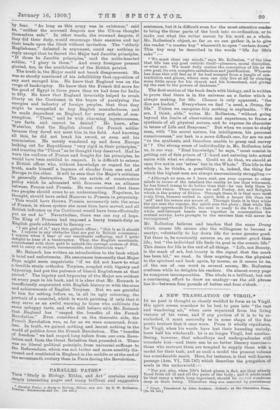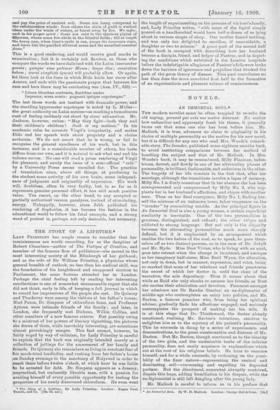A NEW TRANSLATION OF VIRGIL.*
IN no poet is thought so closely wedded to form as in Virgil. His spirit seems somehow to be lost, to pass into "the vast and wandering air," when once separated from the living vesttire of his verse, and if any portion of it is to be re- embodied, it must assuredly be in some shape of the fine poetic texture that it once wore. Prose it wholly repudiates, for Virgil, when his words have lost their haunting melody, loses half his witchcraft: he is no longer Virgil, but another. Seeing, however, that schoolboys and undergraduates still translate him—and there can be no better literary exercise— those who instruct them are tempted to supply them with a model for their task, and as such a model the present volume has considerable merit. Here, for instance, is that well-known passage (Aen. VI., 735-747) which describes the purgation of souls in the underworld :— " Nor yet, alas, when life's latest gleam is fled, are they utterly freed from all ill and all the pests of the body ; and it needs must be that many a taint, long ingrained, should be l'O■lit'd wondrous deep in their being. Therefore they wee .amerced by punishment
_
• Virgil. Translated by John Jackson. Oxfords at the Clarendon Press. [Si. ed. not.] -and pay the price of ancient evil. Some are hung outspread to 'the substanoeless winds : from others the stain of guilt is washed tslean under the waste of waters, or burnt away by fire. We suffer, each in his proper spirit; these are sent to the spacious plains of alysium, where some few abide in the blissful fields ; till at length the hoary ages, when time's cycle is run, purge the incarnate stain, and leave bat the purified ethereal sense and the unsullied essential flame."
This is a good rendering, and would receive good marks in examination; but it is certainly not flawless, as those who compare the words we have italicised with the Latin (exercentur poenis quisque sues patimur Manes ; longa dies ; concretam ‘labem ; aurai simplicis ignem) will probably allow. Or again, let them look at the lines in which Dido hurls her curse after Aeneas, and ends with the passionate prayer that between his race and hers there may be everlasting war (Aen. IV., 628) :—
" Litora litoribus contraria, fiuctibus uncles Imprecor, arma armis pugnent ipsique nepotesque."
'The last three words are instinct with dramatic power, and the startling hypermeter nepotesque is noted by L. Muller— the great authority on Latin metres—as marking a tumultuous rush of feeling suddenly cut short by sheer exhaustion. Mr. Jackson, however, writes: "May they fight—both they and their children's children ! Such is my malison." In his academic calm he corrects Virgil's irregularity, and makes Dido end her speech with strict propriety and a choice archaism. We do not assert that he is wrong, or fail to recognise the general excellence of his work, but in this instance, and in a considerable number of others, his taste differs from our own, and it is natural to ask what real end his volume serves. No one will read a prose rendering of Virgil for pleasure, and surely the issue of a semi-official " crib " by a University Press seems uncalled for. The practice of translation aims, above all things, at producing in the student some activity of his own brain, some independ- ence of judgment and originality of expression. His work will, doubtless, often be very faulty, but, in so far as it represents genuine personal effort, it has still much positive value. The resort, on the other hand, to any accepted or partially authorised version paralyses, instead of stimulating,
energy. Unhappily, however, since Jebb published his rendering of Sophoclee, it has become the fashion in the educational world to follow his fatal example, and a strong word of protest is, perhaps, not only desirable, but necessary.





































 Previous page
Previous page